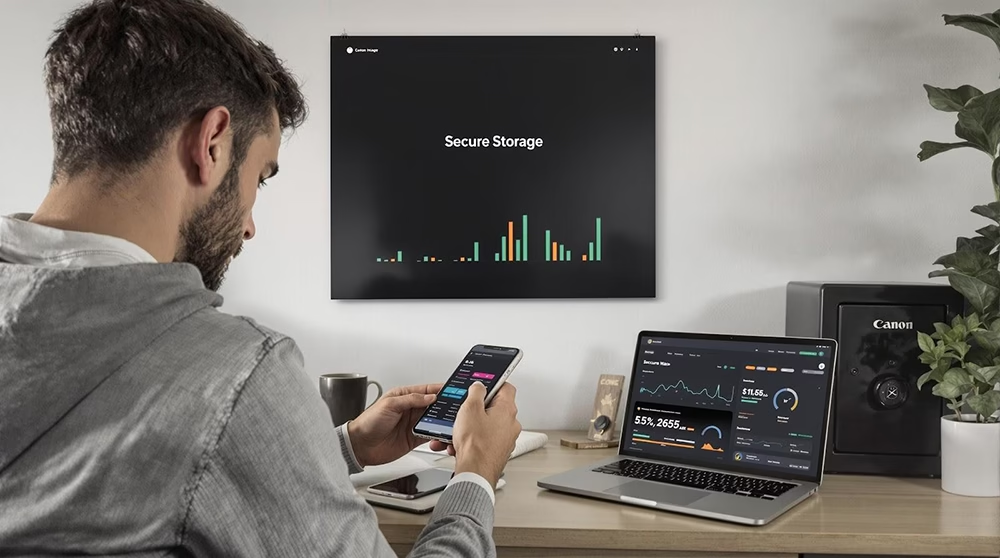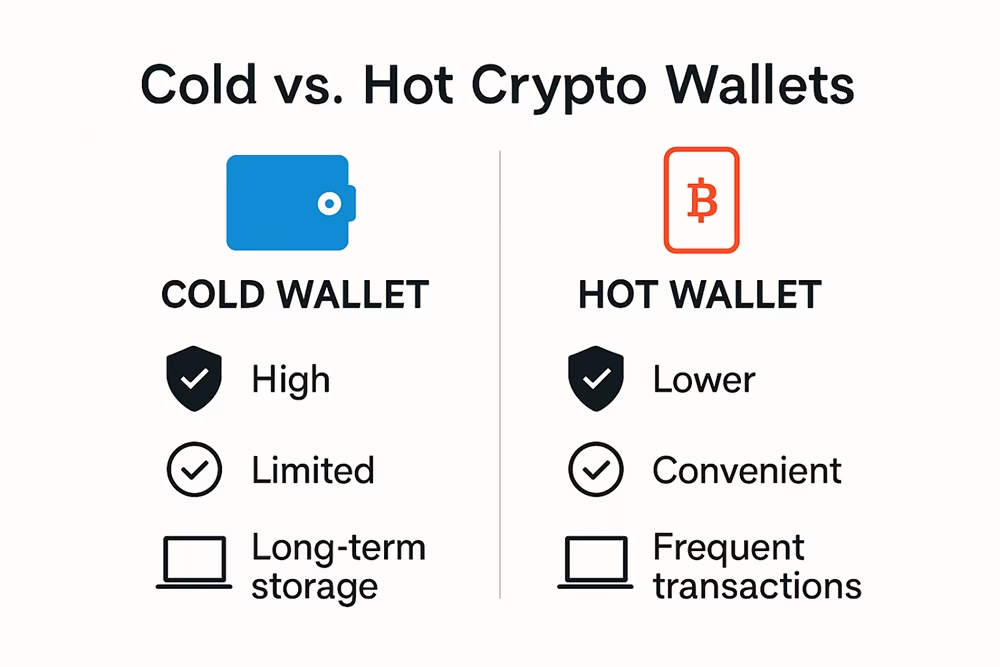
Crypto wallets are everywhere now and picking the right one changes everything for your digital money. You might think the world relies on flashy hot wallets because they make trading so easy, and almost 60 percent of all crypto users keep their funds in hot wallets for daily use. But here is what most people miss. The safest place for your crypto is offline, not online. Cold wallets quietly protect billions in assets while hackers prowl the internet and that changes the whole storage strategy.
| Takeaway | Explanation |
|---|---|
| Hot wallets are convenient but risky | Hot wallets provide immediate access for transactions but are susceptible to hacks and malware due to their constant internet connectivity. |
| Cold wallets offer superior security | Cold wallets isolate private keys from online access, making them ideal for long-term asset storage and protection against cyber threats. |
| Hybrid wallet strategies are effective | Many sophisticated investors use a combination of hot and cold wallets to balance accessibility with enhanced security for larger holdings. |
| Wallet choice impacts financial strategies | Selecting the appropriate wallet type affects liquidity, risk management, and regulatory compliance, making it essential for comprehensive financial planning. |
| Continuous reassessment is key | As the landscape of cryptocurrency evolves, investors should regularly evaluate their wallet strategies to ensure optimal performance and compliance. |
Cryptocurrency storage fundamentally relies on two primary wallet types: cold and hot wallets. These digital storage solutions represent critical infrastructure for protecting digital assets in an increasingly complex cybersecurity landscape.
At the core of cryptocurrency management, wallets serve as digital repositories for storing private keys that enable access and transaction of blockchain assets. According to Connecticut’s Department of Banking, the primary distinction between cold and hot wallets centers on their internet connectivity and associated security profiles.
Hot wallets operate as internet-connected digital interfaces that enable immediate cryptocurrency transactions. These software-based solutions integrate seamlessly with trading platforms, mobile applications, and online exchanges. Britannica’s guide highlights that while hot wallets provide exceptional convenience for frequent traders, they simultaneously expose users to heightened cybersecurity risks.

In stark contrast, cold wallets represent a fortress of digital asset protection. These offline storage mechanisms physically isolate cryptocurrency private keys from online networks, creating a robust security barrier. McAfee’s cybersecurity analysis emphasizes that cold wallets are particularly suited for long-term storage of substantial cryptocurrency holdings.
Cold wallet technologies typically manifest as hardware devices resembling USB drives or specialized physical tokens. These devices generate and store private keys in an environment completely disconnected from internet-based threats. Key advantages include:
The selection between hot and cold wallets depends on individual investment strategies, transaction frequency, and risk tolerance. Sophisticated cryptocurrency investors often employ a hybrid approach, utilizing hot wallets for daily transactions while preserving substantial holdings in cold storage solutions.
Navigating the complex landscape of cryptocurrency storage requires a nuanced understanding of these wallet technologies. By comprehending the fundamental differences between cold and hot wallets, investors can make informed decisions that balance accessibility with robust security protocols.

| Feature | Hot Wallets | Cold Wallets |
|---|---|---|
| Internet Connectivity | Always connected | Completely offline |
| Security Risk | Higher (vulnerable to hacks and malware) | Lower (isolated from online threats) |
| Accessibility | Instant, suitable for daily transactions | Less convenient, best for long-term |
| Storage Form | Software/mobile/web apps | Hardware devices/paper storage |
| Typical Use Case | Trading, frequent transfers | Holding large assets, long-term saving |
| Control | Often managed by third-party services | Direct physical user control |
Cryptocurrency security represents a critical battleground where wallet selection directly impacts digital asset protection. Understanding the nuanced security landscape between cold and hot wallets becomes paramount for investors seeking robust asset management strategies.
Investopedia’s comprehensive analysis reveals that the primary security differential between wallet types centers on internet connectivity and potential exposure to cyber threats. Hot wallets inherently present more significant security challenges due to their constant online presence.
Hot wallets operate within a high-risk digital environment. Their internet-connected nature exposes users to multiple sophisticated attack mechanisms. According to Britannica’s cybersecurity research, these vulnerabilities include:
Cold wallets emerge as the gold standard for cryptocurrency security. The Connecticut Department of Banking emphasizes that offline storage mechanisms provide a formidable defense against digital threats.
Sophisticated cryptocurrency investors frequently implement hybrid security approaches. This strategy involves maintaining smaller transaction amounts in hot wallets while preserving substantial holdings in cold storage. Such a balanced methodology allows for operational flexibility without compromising overall asset protection.
The cryptographic landscape continuously evolves, with emerging technologies introducing more sophisticated security mechanisms. Investors must remain vigilant, regularly updating their security protocols and understanding the dynamic nature of digital asset protection.
Ultimately, selecting between cold and hot wallets transcends simple convenience. It represents a critical risk management decision that directly impacts the safety and accessibility of digital assets. Comprehensive understanding of each wallet type’s strengths and limitations empowers investors to make informed, strategic choices in an increasingly complex digital financial ecosystem.
| Security Aspect | Hot Wallets | Cold Wallets |
|---|---|---|
| Exposure to Malware | High (due to internet connection) | Very low (offline, not exposed) |
| Susceptibility to Hacking | High | Low |
| User Control | Depends on platform/third party | Full physical control by owner |
| Typical Authentication | Passwords, 2FA, software-based security | Device PINs, hardware authentication |
| Risk of Remote Theft | High | Extremely low |
| Best for | Frequent, small transactions | Long-term, large-amount storage |
The intersection of Bitcoin mining and AI trading demands sophisticated wallet strategies that balance security, accessibility, and performance. Selecting the right wallet becomes a critical decision for professionals operating in high-stakes digital asset environments.
According to research from arXiv, cryptocurrency wallet selection for mining and AI trading requires a nuanced approach that transcends traditional storage methodologies. The unique demands of these technological domains necessitate advanced wallet configurations that can seamlessly integrate operational efficiency with robust security protocols.
Bitcoin mining operations require wallets with specific performance attributes. These specialized storage solutions must simultaneously manage high-volume transactions while maintaining maximum security. ResearchGate’s comparative study highlights that hybrid wallet approaches often provide the most flexible solution for mining professionals.
AI trading platforms demand wallet technologies that offer real-time responsiveness and comprehensive security frameworks. Our research publications demonstrate that successful AI trading requires wallet solutions capable of integrating advanced computational requirements with secure asset management.
Most sophisticated investors and traders implement hybrid wallet strategies. This approach involves maintaining smaller transaction volumes in hot wallets while preserving substantial holdings in cold storage. Such methodologies provide a balanced approach that maximizes both operational flexibility and asset protection.
Research from cybersecurity studies indicates that emerging wallet technologies continue to evolve, introducing more complex security mechanisms designed to address the unique challenges of high-performance digital asset management.
Navigating the complex ecosystem of Bitcoin mining and AI trading requires continuous adaptation. Professionals must remain vigilant, regularly reassessing their wallet technologies to ensure optimal performance, security, and compliance with emerging blockchain innovations.
Cryptocurrency finance strategies are fundamentally shaped by wallet selection, representing a critical decision that extends far beyond simple storage mechanisms. The nuanced choice between hot and cold wallets profoundly influences risk management, operational flexibility, and overall investment performance.
According to research from MDPI, wallet selection directly impacts an investor’s ability to implement sophisticated financial strategies. The inherent characteristics of different wallet types create distinct operational frameworks that can significantly alter investment approaches.
Investors must carefully consider how wallet technologies align with their specific financial objectives. Hot wallets offer immediate liquidity and transaction capabilities, while cold wallets provide enhanced security for long-term asset preservation. The International Monetary Fund’s analysis highlights the critical nature of this strategic decision, emphasizing that wallet choice is not merely a technical consideration but a fundamental component of comprehensive financial planning.
Our comprehensive research insights demonstrate that wallet selection extends beyond technical capabilities. Regulatory landscapes increasingly scrutinize cryptocurrency storage methods, making wallet choice a critical compliance consideration.
Advanced financial strategies now incorporate wallet selection as a core component of risk management. Comprehensive research from medical informatics platforms reveals that sophisticated investors are developing increasingly complex approaches to wallet management.
The financial landscape surrounding cryptocurrency continues to evolve rapidly. Investors must remain agile, continuously reassessing their wallet strategies to maintain optimal performance, security, and regulatory compliance.
Ultimately, wallet choice represents more than a technical decision. It is a strategic financial instrument that directly impacts an investor’s ability to navigate the complex and dynamic world of digital asset management. Professionals must approach wallet selection with the same rigor and strategic thinking applied to traditional financial planning.
Cold wallets are offline storage solutions that isolate cryptocurrency private keys from the internet, providing maximum security for long-term asset storage. Hot wallets, on the other hand, are connected to the internet and allow for immediate transactions but are more vulnerable to hacks and malware.
While hot wallets offer convenience for daily transactions, they carry higher security risks due to constant internet connectivity. It’s advisable to only keep small amounts in hot wallets for trading and use cold wallets for larger, long-term holdings.
Choosing the right wallet depends on your investment strategy. If you frequently trade, a hot wallet may be suitable for ease of access. However, for long-term storage of significant amounts, a cold wallet is recommended for enhanced security.
Yes, many investors utilize a hybrid approach, where they keep a portion of their assets in hot wallets for quick access and transactions, while storing the majority of their holdings in cold wallets for optimal security.
Reading about cold versus hot wallets in crypto shows just how quickly a simple storage choice can put your digital assets at risk. The pain point is real. Even experienced miners and AI traders face threats from malware and online attacks just because their wallets are always connected. You need more than daily convenience. You deserve professional security for every Bitcoin you earn or manage.

You can take control of your digital asset safety, starting today. With Blockware Solutions, you get instant access to expert-hosted Bitcoin mining, state-of-the-art Mining-as-a-Service, and clear guidance on cold storage integration. Protect your mined coins for the long term by choosing a partner that understands both performance and security. Ready to bridge powerful earning with serious security? Visit Blockware Solutions now and see how easy it is to combine leading-edge mining with robust cold wallet protection.